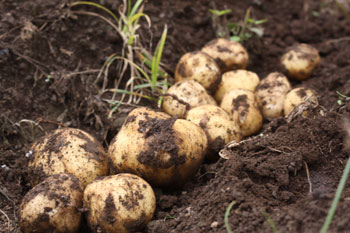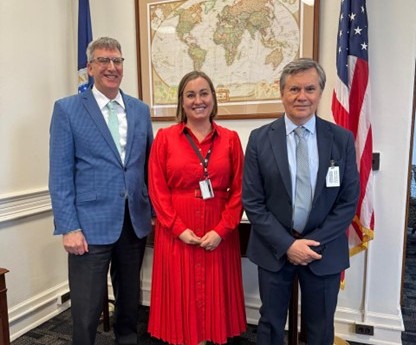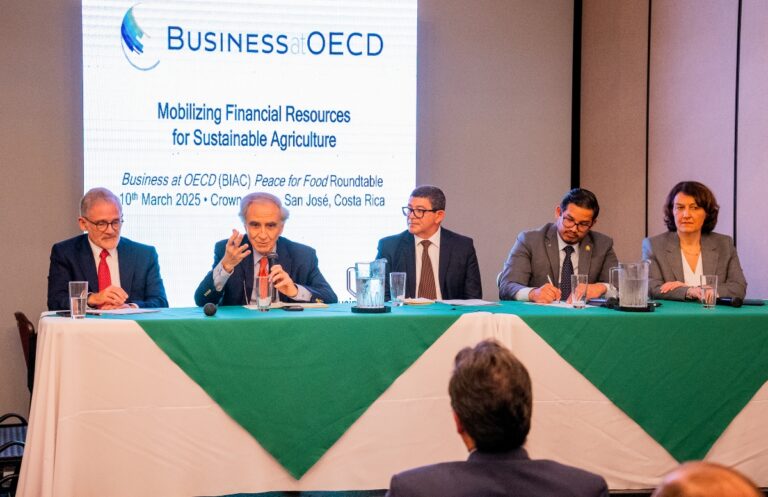ICA and the European Union signed a cooperation agreement under which 8.6 million Euros will be provided to strengthen institutions in the Caribbean involved in the issue of food security.

Georgetown, Guyana, April 2013 (IICA). The Inter-American Institute for Cooperation on Agriculture (IICA) and the European Union (EU) signed a contribution agreement involving funding of 8.6 million Euros, under which the IICA is to spearhead and coordinate a four-year regional food security program in the Caribbean.
The beneficiary countries are the members of CARIFORUM: Antigua and Barbuda, Barbados, Belize, Dominica, Dominican Republic, Grenada, Guyana, Haiti, Jamaica, Saint Kitts and Nevis, Saint Lucia, Saint Vincent and the Grenadines, Suriname, The Bahamas, and Trinidad and Tobago.
This initiative is framed within the tenth European Development Fund (EDF) of the European Union for the African, Caribbean, and Pacific (ACP) countries. The main instrument providing Community development aid in the ACP countries, the EDF comprises several components, mainly grants, risk capital, and loans to the private sector.
The agreement was signed at the offices of the EU delegation in Georgetown. The dignitaries who took part in the ceremony included the President of Guyana, Donald Ramotar; the Head of the Delegation of the European Union in Guyana, Robert Kopecky; the Secretary General of CARICOM, Irwin La Rocque; and IICA’s Representative in Trinidad and Tobago, Gregg Rawlins.
IICA will be the executing agency, while the Caribbean Agricultural Research and Development Institute (CARDI) and the CARICOM Secretariat will be responsible for the technical oversight and implementation of the program.
The objective of the program is to strengthen incentives, policies and programs for smallholders in the region, who make up the majority of farmers. Another goal will be to improve food security at the regional, national, and local levels by increasing the production and productivity of selected agricultural products, and enhancing the capacity of regional agricultural institutions.
The initiative includes a specific component for women and young people, as these groups have been identified as key to the sector’s sustainability.
The participants in the process will be the ministries of agriculture; CARIFORUM institutions devoted to agricultural education; the Caribbean Farmers Network (CaFAN), which will be the main partner for the work with the smallholders’ interest groups; the Junta Agroempresarial Dominicana (JAD); the Caribbean Agribusiness Association (CABA); national agroindustry associations; local authorities; and, non-governmental organizations.
The Head of the Delegation of the European Union in Guyana, Robert Kopecky, said the Caribbean region faced a series of challenges, including those posed by climate change, natural disasters, food prices, the small size of domestic markets, and reliance on a few export commodities. The promotion and development of small-scale agriculture was designed to permit greater integration at the local, national, and regional levels, and insertion into global markets.
Kopecky mentioned that IICA had been selected to implement the system on behalf of the CARIFORUM countries based on its reputation as one of the main technical organizations working in the field of agriculture within the community.
He added that the agreement was unique for several reasons, since it was a multidimensional program designed to address the interconnection between policies and technical issues related to applied research, technology, and innovation, and the development of markets, all focused on smallholders.
IICA’s Director of Management and Regional Integration, Diego Montenegro, noted that the program dovetailed perfectly with the Institute’s 2010-2014 Medium-term Plan, specifically with two of its strategic objectives: to improve agricultural productivity and competitiveness, and agriculture’s contribution to food security.
The European Union awarded this contribution agreement to IICA as the Institute meets the requirements of its Four Pillar Assessment.
The Four Pillar Assessment entails an exhaustive evaluation of the parameters of IICA’s accounting, audit, internal control, and public contracting standards. A report issued in 2009 stated that IICA’s Offices were qualified to sign contribution agreements with EU delegations.
Thanks to the Four Pillar Assessment, since 2009 the EU and IICA have been working together more closely than ever, and have strengthened ties through the signing of other contribution agreements in Haiti and Belize.
For IICA, working with strategic partners the EU is central to the Institute’s efforts to maximize its impact, as stated in the 2010-2020 Strategic Plan: “The Institute will promote the development of partnerships and the “working together” approach in its relations with strategic partners at the national, regional, and hemispheric levels, articulating and developing thematic networks.”
For more information, contact:
diego.montenegro@iica.int











